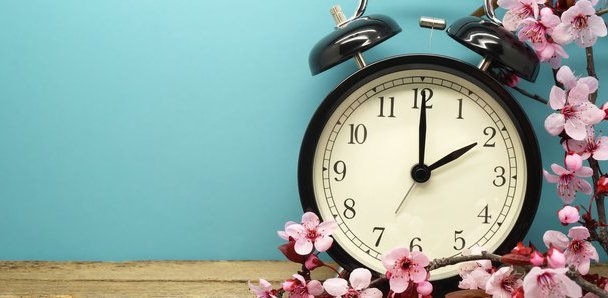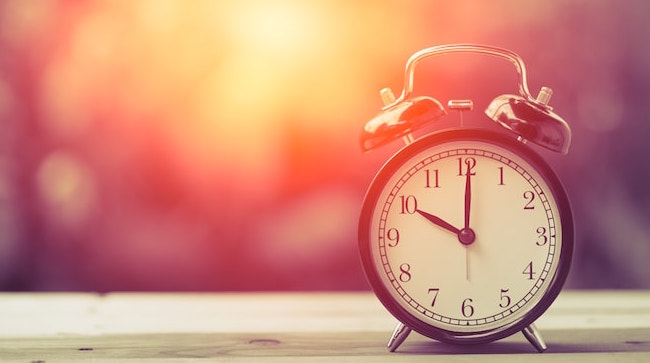The clocks go forward each year in March which prepares the country for the summer warmer weather which means longer and lighter days.
However, this also means that you lose an hour on Saturday night when the clocks go forward. Our sleep cycles are affected by our immediate environment, seasons and weather which means that even moving the time ahead by just an hour can have an impact.
This has an effect on Melatonin levels which is a sleep hormone that makes us feel tired at night and ready to go to sleep. Moving the clocks forward causes Melatonin concentration levels to rise earlier in the evening and then drop off in concentration earlier the following morning.
But there are many things you can do to prepare your body for this change without it affecting your body.
Why do the clocks change?
Daylight saving was first introduced when it was noticed that when we moved into the summer months, hours of early morning daylight were being wasted when they could be used much more productively.
This became a national bill and British Summer Time was enforced meaning that the clocks go forward by an hour on the last Sunday of March each year, with time going back by an hour on the last Sunday of October.
This change boosts the productivity of the economy, and this has led to a worldwide shift where many countries also adopt the same system of altering the time throughout the year to make the most of daylight hours.

How to adjust to the clock change as quickly as possible?
1. Have an Early Night
To ensure that your body clock shifts to the new time change you need to make sure that you don’t lose that hour.
In the build-up to the time change you can go to bed half an hour earlier on Friday and Saturday which will make it easier to fall asleep on Sunday night after the clocks have gone forward.
This can be harder in practice if you have commitments such as work which means that you can’t go to sleep earlier, but if you can incorporate this idea into your schedule, then you’ll fly through the clock change.
2. Exercise
Exercising is a great way to adjust your body because this increases the production of Serotonin which is also an essential hormone in the regulation of sleep.
Being outdoors is also great because natural light is used to adjust our body's natural alarm clock which is the reason why we naturally wake up when it gets brighter in the morning.
This is a trigger to cause our body to reduce the production of the sleep hormone Melatonin. If you feel tired during the clock change, then head outside, and it doesn’t need to be strenuous exercise just a brisk walk will be sufficient.
If exercising isn’t your thing, then a more relaxed approach can also make it easier to sleep. Stretching or meditation can work by winding your body down both physically and mentally. Even adjusting your environment by dimming lights and turning off electrical devices can get your body ready for bed.
3. Take a Nap
If you do feel tired, then have a quick catch up by taking a nap. A nap of 30 -90 minutes on Sunday that the clocks go forward will do the job. Ideally, you should break this up into naps of no more than 30 minutes; otherwise, your body falls into a deep sleep which when broken gives you a tired feeling.
However, although it may be tempting, don’t sleep too much; otherwise, you may find It hard to go to sleep later in the evening.
4. Eat Before Sleep
As you may know, when it’s time to sleep your body starts to increase its production of the sleep hormone Melatonin, and our bodies begin to relax for sleep. Tryptophan is a precursor to Melatonin which can also help our body to start to wind down.
Certain foods contain this amino acid including dairy and nuts. Your body may not be ready to go to sleep an hour earlier, but this can help speed up the process. Our personal choice is bananas because they also contain other vital minerals such as Potassium and Magnesium.
5. Avoid Coffee
Caffeine is a popular stimulant that many people use especially first thing in the morning to help us feel more awake.
The effect of caffeine then eases off by the time we reach the evening, and it’s time to sleep. But in some cases, this isn’t possible if you have it later in the day because caffeine stays present in the body for around six to eight hours.
To make the transition to the new time change you should drink coffee alternatives such as Green tea which still contains caffeine but much less than a standard coffee.
6. Avoid Alcohol
Alcohol is often misunderstood as being suitable for sleeping because it makes you feel tired, but it affects the quality of your REM sleep which leaves you feeling tired the following day.
Alcohol is also a diuretic which not only dehydrates you but will disturb your sleep because you may need to go to the toilet more frequently during the night.
7. Wake up Earlier on Saturday
You may not be able to go to bed earlier on Friday night but getting up an hour earlier on Saturday morning will have a similar effect. This is because when it comes to sleep on Saturday night you’ll be more tired and more likely to fall asleep because you’ve had an hour less sleep.
8. Don’t Overcompensate
Don’t overcompensate by staying in bed for an extra hour when the clocks change even though it can be tempting. After a few days, your body will be completely adjusted, and you’d be better off just going to bed earlier on Saturday night.
9. Relax
You need to relax because stress also affects the quality of our sleep. The clocks are only moving an hour, and the human body can make a small adjustment like this quite easily.

